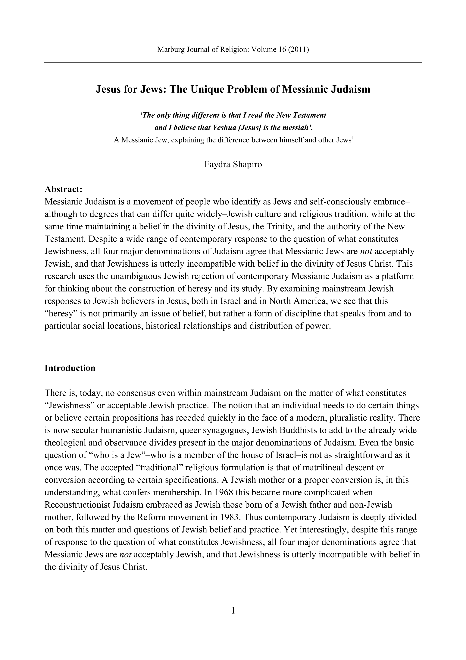Jesus for Jews: The Unique Problem of Messianic Judaism
Messianic Judaism is a movement of people who identify as Jews and self-consciously embrace–although to degrees that can differ quite widely–Jewish culture and religious tradition, while at the same time maintaining a belief in the divinity of Jesus, the Trinity, and the authority of the New Testame...
محفوظ في:
| الحاوية / القاعدة: | Marburg Journal of Religion |
|---|---|
| المؤلف الرئيسي: | |
| التنسيق: | Artikel (Zeitschrift) |
| اللغة: | الإنجليزية |
| منشور في: |
Philipps-Universität Marburg
2011
|
| الموضوعات: | |
| الوصول للمادة أونلاين: | الوصول للمادة أونلاين |
| الوسوم: |
إضافة وسم
لا توجد وسوم, كن أول من يضع وسما على هذه التسجيلة!
|
| الملخص: | Messianic Judaism is a movement of people who identify as Jews and self-consciously embrace–although to degrees that can differ quite widely–Jewish culture and religious tradition, while at the same time maintaining a belief in the divinity of Jesus, the Trinity, and the authority of the New Testament. Despite a wide range of contemporary response to the question of what constitutes Jewishness, all four major denominations of Judaism agree that Messianic Jews are not acceptably Jewish, and that Jewishness is utterly incompatible with belief in the divinity of Jesus Christ. This research uses the unambiguous Jewish rejection of contemporary Messianic Judaism as a platform for thinking about the construction of heresy and its study. By examining mainstream Jewish responses to Jewish believers in Jesus, both in Israel and in North America, we see that this “heresy” is not primarily an issue of belief, but rather a form of discipline that speaks from and to particular social locations, historical relationships and distribution of power. |
|---|---|
| DOI: | 10.17192/mjr.2011.16.3288 |
 Publikationsserver
Publikationsserver